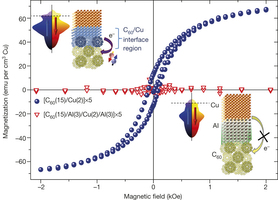|
xxxx
|
 XXXXXXXXXXXXXXXXXXXXXXXXXXXXXXXXXXXXXXXXXXXXXXXXXXXXXXXXXXXX XXXXXXXXXXXXXXXXXXXXXXXXXXXXXXXXXXXXXXXXXXXXXXXXXXXXXXXXXXXX
Beating the Stoner Criterion Using Interfaces.
BaC6
Francisco José Garanhani
Tuesday, October 11, 2016
Only three elements are ferromagnetic at room temperature: the transition metals iron, cobalt and nickel. The Stoner criterion explains why iron is ferromagnetic but manganese, for example, is not, even though both elements have an unfilled 3d shell and are adjacent in the periodic table: according to this criterion, the product of the density of states and the exchange integral must be greater than unity for spontaneous spin ordering to emerge. Here we demonstrate that it is possible to alter the electronic states of non-ferromagnetic materials, such as diamagnetic copper and paramagnetic manganese, to overcome the Stoner criterion and make them ferromagnetic at room temperature. This effect is achieved via interfaces between metallic thin films and C60 molecular layers. The emergent ferromagnetic state exists over several layers of the metal before being quenched at large sample thicknesses by the material’s bulk properties. Although the induced magnetization is easily measurable by magnetometry, low-energy muon spin spectroscopy provides insight into its distribution by studying the depolarization process of low-energy muons implanted in the sample. This technique indicates localized spin-ordered states at, and close to, the metal–molecule interface. Density functional theory simulations suggest a mechanism based on magnetic hardening of the metal atoms, owing to electron transfer. This mechanism might allow for the exploitation of molecular coupling to design magnetic metamaterials using abundant, non-toxic components such as organic semiconductors. Charge transfer at molecular interfaces may thus be used to control spin polarization or magnetization, with consequences for the design of devices for electronic, power or computing applications.
View full text
|